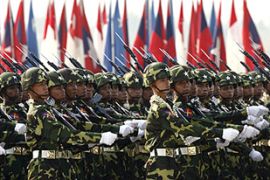Show of strength by Myanmar army
Military leader tells soldiers to “crush” any efforts to destabilise the country

His comments came in a speech on Thursday to 13,000 soldiers following an annual military parade celebrating the army’s strength.
The 74-year-old general, who has reportedly been suffering from ill-health, said his military government “has been making necessary preparations without losing sight of its ultimate aim, to hand over the state powers to the people.”
Armed Forces Day, a national holiday in Myanmar, celebrates the Burmese Independent Army’s revolt against Japanese occupation during the Second World War.
This year’s parade comes six months after Myanmar‘s ruling military launched a bloody crackdown on anti-government protests triggered by rising fuel prices.
Avoiding any mention of the protests in his speech, Than Shwe instead called on his troops “to join hands with the people to crush internal and external destructive elements sabotaging stability and progress of the state.”
Hardships
Thursday’s parade took place in the military government’s remote and newly-built capital, Naypyidaw – a hot and dusty town surrounded by dense forests in central Myanmar.
The pomp and ceremony of the parade contrasts sharply with the daily hardships suffered by most of Myanmar‘s people.
Reports from activists and aid groups say that poverty has only worsened following the September crackdown with Thursday’s parade an illustration that the military has no intention of relinquishing its powerful position.
Trevor Wilson, a former Australian ambassador to Myanmar, told Al Jazeera that for Myanmar‘s military rulers Armed Forces Day is the most important ceremonial event in the calendar.
He said the parades are not designed to show off military hardware, but rather “to showcase the important role that the army has played in the formation and maintenance of the state.”
Mediation
Earlier this month the United Nations’ special envoy to Myanmar, Ibrahim Gambari, visited the country for the third time since the crackdown.
The visit had been intended to push forward mediation efforts between the military and the opposition, but made apparently little progress.
Gambari’s requests to meet Than Shwe were turned down, although the envoy was allowed to hold two rounds of talks with Aung San Suu Kyi, Myanmar‘s detained opposition leader.
The military government also turned down Gambari’s proposal for a UN role in a referendum scheduled for May on a new constitution.
The draft constitution – which has so far not been made public – forms a key stage in what the military calls its “roadmap to democracy”, paving the way to multiparty elections in 2010.
However, under the new constitution Aung San Suu Kyi will be barred from standing in the election because she was married to a foreigner.
Her husband, British citizen Michael Arris, died in 1999.